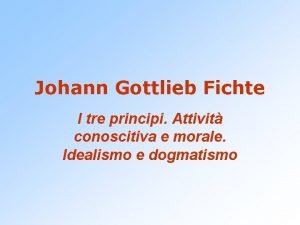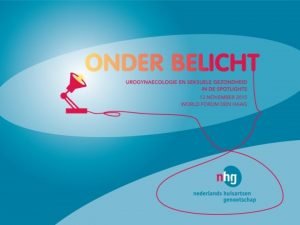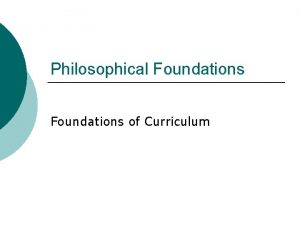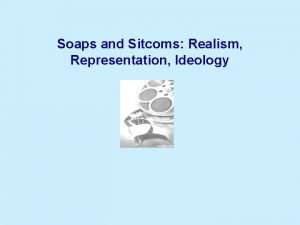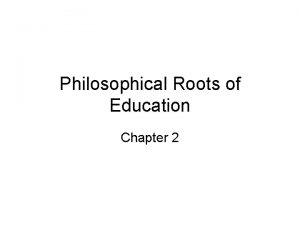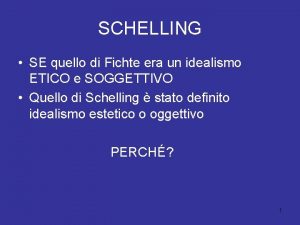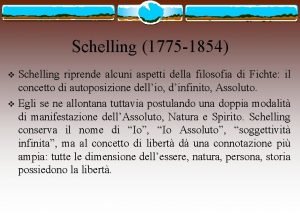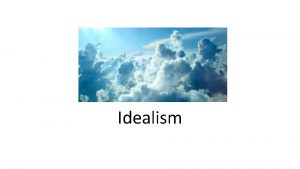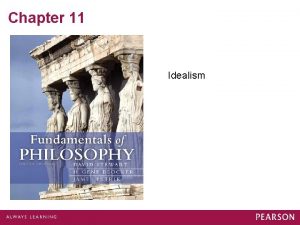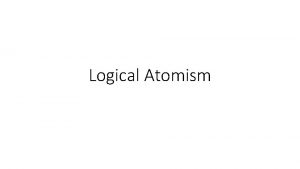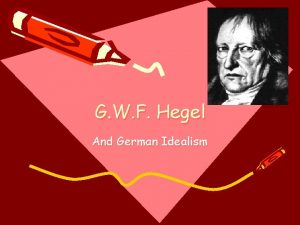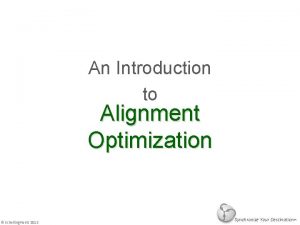Fichte and Schelling Introduction to German Idealism The












- Slides: 12

Fichte and Schelling Introduction to German Idealism

The Origin of German Idealism n n n 1. Philosophical Background: Critique on Kantian Doctrine of “das Ding an sich” 2. Theological Background: German idealism is a kind of ‘rationalization’ or ‘demitologization’ of Christian theology. 3. Historical Background: Romantic movement, French Revolution etc.

Subject or pure intelligence Das Ding an sich

Fichte and The Doctrine of “Pure Ego” n n n In his work Wissenschaftslehre (Theory of Science), Fichte formulates his idealism that philosophy must be scientific. What does ‘scientific’ mean? 1. Philosophy must be coherence (deductive logic) and systematic 2. Philosophy must be exact like mathematic.

Two Kinds of Presentation n According to Fichte our empirical life, like a journey in Venice, is a presentation (Vorstellung) that is accompanied with the sense of necessity. But our free imagination, like a journey in Mars or another Galaxies, is a presentation that is accompanied with the sense of freedom.

If the “das Ding an sich” is erased n n n So, Fichte thought that our reality outside our mind is our presentation. He got this position from his critique on Kant. He erased “das Ding an sich” und views the reality as the Subject or Ego (like cartesian Cogito in absolute ‘size’). He calls the reality (Being) ‘pure Ego’ (absolutes Ich).

Three Steps of “Being” n n The whole reality can be seen as three moments of pure ego: 1. The first moment is the pure ego in it self. That is the reality that has not been conscious of itself. 2. The second moment: The pure ego differs in itself two aspects, ie. Ego and non-ego. But both of them are still absolute 3. The third moment: Both of them limit themselves and become limited ego and limited non-ego.

Limited Ego (John Smith) Pure Ego Pure Non-Ego Limited Non-Ego (That Table)

The Tree in front of us n n n What does Fichte mean with empirical and concrete objects like the tree in front of us? That tree is the limited non-ego, whereas our consciousness (subject) of it is the limited ego. So, the pure ego is a result of infinite regression of our consciousness, a reflection on reflection.

Schelling and Absolute Identity n Schelling rejects Fichte’s Idealism. He views the reality neither as subject nor as object, but as identity of subject and object.

Philosophy of Identity n Schelling’s Philosophy is called philosophy of identity. He tried to overcome the distinction between subject and object not only in our consciousness but also in the whole Being. So, he imagined that in the beginning there were not dichotomy between consciousness and nature. The absolute is an absolute identity of consciousness and nature, thinking and thing.

Three Moments of Identity n n The first moment is the pure identity of subject and object in itself. Schelling calls it with Spinozian term ‘naturans’ or the internal life of the absolute. The second moment is the externalization of the pure identity into ‘naturata’ or objective nature (our empirical reality). The third moment is the synthesis between the absolute as inner life and the absolute as objective nature. That is the pure identity in its end unity. All three moment are the one action of reality.


